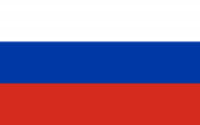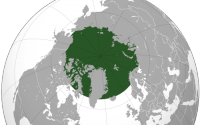Revision of U.S. ratification of UNCLOS would help resolve disputes with Russia in Arctic from Tue, 02/08/2022 - 14:57
Tension between Russia and other Arctic nations will remain high as they continue to compete for Arctic territory. Maintaining UNCLOS as a viable legal framework for settling Arctic territorial claims should help avert potential confrontations between Russia and other UNCLOS members.
Quicktabs: Arguments
The Western Gap agreement has clear implications for the Arctic, where the United States shares a potential extended continental shelf with both Russia and Canada. UNCLOS opponents suggest that questions regarding international legal title to the U.S. potential extended continental shelf in the Arctic will be resolved conclusively when the United States enters bilateral agreements with Russian and Canada respectively.156 As simple and therefore attractive as this position may be, it begs several questions.
Under what legal authority would the Arctic neighbors have the right to divide and claim for themselves an area lying, at least in theory, beyond their respective national jurisdictions? Even assuming a legitimate legal basis to claim their extended continental shelves and delimit them bilaterally, what basis would the states have for desiring to and concluding their agreements outside the UNCLOS framework, including ignoring Article 82 royalty payments? Finally, even if Russia and Canada— both UNCLOS member states—choose to comply with UNCLOS on their respective sides of delimited shelves, might they object to the United States not doing so on its side, and, if so, would they pursue their objections? And how might the outer limits of the U.S. extended continental shelf in the Arctic be determined given the geographic differences from the Western Gap situation where there were only two geographically opposite states with no third state or area interests involved?
The simple answer is that only by acceding to the convention can the United States obtain its full continental shelf rights in the Arctic.
Recent geopolitical developments in the Arctic region highlight yet another circumstance where both UNCLOS and U.S. national security interests are implicated, as thawing Arctic floes have brought the Arctic Ocean's untapped resource and navigation potential increasingly to the fore. States with Arctic Ocean borders-United States, Canada, Russia, Finland, Iceland, Norway, and Sweden-are, therefore, concerned with the full spectrum of national security implications-political, economic, and military-associated with increased Arctic Ocean maritime transit and resource related activity. Conflicting claims to the Arctic Ocean's waters and seabed have already commenced. A prime example is Russia's 2007 claim to the Lomonosov Ridge a 1,200 mile long undersea swath in the vicinity of the North Pole as part of its continental shelf.68 While the Lomonosov Ridge is currently considered beyond the jurisdictional reach of any country and, therefore, administered by the ISA69 "Note: Frozen Assets: Ownership of Arctic Mineral Rights Must be Resolved to Prevent the Really Cold War ." George Washington International Law Review. Vol. 41, No. 3 (2011): 651-680. [ More (5 quotes) ], confirmation of its claim to exclusive resource extraction rights.70 Indeed the trend toward utilizing the CLCS appears to be intensifying, and will likely play a central role in de-conflicting Arctic Ocean claims. One such indication is the 500% year to year increase in petitions submitted to the CLCS from 2008 to 2009. As in the East and South China Sea, it appears likely that UNCLOS and its regulatory entities will play acritical role in economic and national security "scrum" beginning to play out in the Arctic region.
Meanwhile, Russia’s actions and rhetoric in the Arctic leave no room to deduce anything but a firm and committed intent on the part of its leadership to secure its claims. There have been scant, if any, peaceful actions undertaken by the Putin and Medvedev administrations to back up their peace-seeking rhetoric. Calls for diplomatic resolution of territorial disputes in the Arctic and for working “within existing international agreements and mechanisms” have only been operationalized through agreements to cooperate on search and rescue efforts and on (competitive) scientific exploration and research for submission to the Commission on the Limits of the Continental Shelf (CLCS), a forum that has no binding authority to settle such disputes. All the while, however, Russia’s ambitious militarization of the Arctic has been clearly reinforced with explicit rhetoric proclaiming its intent to defend its national security interests. For Russia, the natural resources in the Arctic are a national security asset of strategic importance.
Until such a solution is found, the Arctic countries are likely to unilaterally grab as much territory as possible and exert sovereign control over opening sea-lanes wherever they can. In this legal no man's land, Arctic states are pursuing their narrowly defined national interests by laying down sonar nets and arming icebreakers to guard their claims. Russia has led the charge with its flag-planting antics this past summer. Moscow has been arguing that a submarine elevation called the Lomonosov Ridge is a natural extension of the Eurasian landmass and that therefore approximately half of the Arctic Ocean is its rightful inheritance. The UN commission that is reviewing the claim sent Russia back to gather additional geological proof, leading Artur Chilingarov, a celebrated Soviet-era explorer and now a close confidant of Russian President Vladimir Putin, to declare, "The Arctic is ours and we should manifest our presence" while leading a mission to the North Pole last summer.
Like the other Arctic nations, except the U.S., Russia is a signatory to UNLOS. The USSR became a signatory in 1982; UNCLOS was later ratified in 1997 by the Russian Federation.117 Russia has utilized the provisions of UNCLOS to advance sovereignty, especially along the Northern Sea trade route, which passes through Russia’s northern Exclusive Economic Zone (EEZ). Russia is using UNCLOS provisions in an attempt to exercise control over the Northern Sea route by requiring vessels to seek permits and submit their vessels to inspection due to the ice conditions. This is considered an overreach of authority by the U.S., which is protesting the plans.118 As a non-party to UNCLOS, the U.S. cannot utilize the established means of the treaty to protest.
From the U.S. perspective, the crucial issue is not merely the minerals that it can claim, but the potential for a major shift in the relative mineral wealth of Russia vis-a-vis its neighbors. A growing dispute between Russia and Norway is perhaps the most important of these. In 2001, Russia submitted its definition of its continental-shelf borders. Russia's claim is widely considered a significant overreach, since it claimed a shelf extending almost to the North Pole and it made territorial claims that impinged on oil- and natural gas-rich Norwegian claims (claims that have long been widely, if informally, acknowledged as belonging to Norway) in the Barents Sea. Though Norway's claim, released in late 2006, is in some ways more realistic, it appears to have been drafted to meet Russia's aggressive claim in kind.
With Russia increasingly aggressive in its use of oil and natural gas as a lever against Europe, it will fall in part to UNCLOS (and possibly the CLCS) to make decisions that will affect the reserves and production potential of Norway and Russia.
As it stands now, the CLCS is highly unlikely to support one side over the other, and it will throw the decision over the extent of continental shelf ownership to the two countries to negotiate, a resolution that bodes ill for Norway. Treaty advocates say this would not necessarily be the case if the United States were involved in the organization.
National security-focused advocates in the United States say the country's nonparticipation in UNCLOS shuts out Washington from being able to meaningfully influence how UNCLOS resolves the disputed claims. Industry, from oil and natural gas producers to their major customers in the chemical and transportation industries, also wants the United States to have a seat at the table.
The general discourse on the Arctic has focused on the risks of military escalation. Though security is a relevant factor when discussing Arctic issues, the region is unlikely to witness military escalation. U.S. Special Representative for the Arctic, Admiral Robert J. Papp, Jr., recent remarks suggest that Russia is not militarizing the Arctic are insightful. Papp noted that the U.S. does not believe Russia is acting unreasonably as the melting Arctic is driving increased maritime traffic in Russia’s waterways.
The Arctic region has tremendous global potential, if not for its resources, but for the environmental and ecological impact of its changing landscape. The nature of the environment in the Arctic favors collaboration rather than competition. The rhetoric may at times appear aggressive in nature, however Arctic nations, including Russia, understand that in order to reap the benefits of the Arctic, cooperation will be crucial. In a global environment marked by instability, conflict and a rise in mistrust, the Arctic region might prove to be a region where trust can be rebuilt and cooperation re-established between global powers.
U.S. freedom of navigation interests in the Arctic would be bolstered by joining UNCLOS. Both Russia and Canada have maritime claims in the Arctic that are inconsistent with the rules contained in the Convention. Russia37 and Canada38 draw excessive straight baselines in the Arctic and restrict the right of transit passage in various international straits in the Arctic, including the Northeast Passage, the Northwest Passage and vari- ous straits located within Russia’s Northern Sea Route (NSR)—the Demitri, Laptev and Sannikov Straits. Russia’s straight baselines closing the NSR straits and Canada’s straight baselines around its Arctic Islands do not meet the legal criteria contained in Article 7 of the Convention.39 According to UNCLOS Article 5, the correct baseline for these areas is the low-water line. UNCLOS Article 38 also provides that the right of transit pas- sage through international straits cannot be suspended or impeded by the bordering States. Use of straight baselines by Russia and Canada to close these international straits is therefore inconsistent with the Convention. Furthermore, under UNCLOS Article 8(2), all nations enjoy at least the right of innocent passage in areas within newly drawn straight baselines. The United States has diplomatically protested and operationally challenged these excessive straight baseline claims under the U.S. Freedom of Navigation Program, citing the provisions of UNCLOS and customary international law.40 However, the U.S. legal position would be on better footing if the United States was a party to the Convention.
Pages

The Editorial board argues that another reason for the U.S. to ratify UNCLOS is that it would give it more ability to challenge Russia's military expansion into the Arctic.
[ More ]
The author argues that "[t]he U.S. would be wise to ratify the United Nation Convention on the Law of Sea [UNCLOS], a convention that the U.S. Navy and coast guard already abide by, allowing the United States to utilize the international legal framework to successfully petition its case in the Arctic. In a world growing in tensions between old foes, the Arctic could prove an opportunity to cool down tensions and rebuild trust between the West and Russia."
[ More ]
The author evaluates the expanding cooperation between India and Russia in the Arctic and argues that "[w]hile the Arctic might not seem like a priority for many Americans, it should not be overlooked as an important region for salvaging the U.S.-Russian relationship."
[ More ]
Tense relations between Russia and the US and NATO could potentially be cooled through Arctic cooperation, according to the program director at the George Washington Institute for European, Russian, and Eurasian Studies.
[ More ]
Russia possesses the world's most Arctic shoreline, water, and operating resources. But the United States is also an Arctic nation, even if much of the American public tends to under-appreciate this special status. With frigid international tensions and the severe impacts of climate change swirling like a perfect polar storm, the United States can't afford to ignore the opportunities and obligations that come with being one of the world's few Arctic nations.
[ More ]